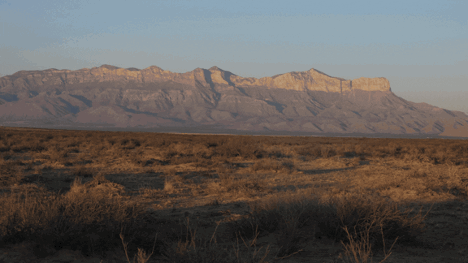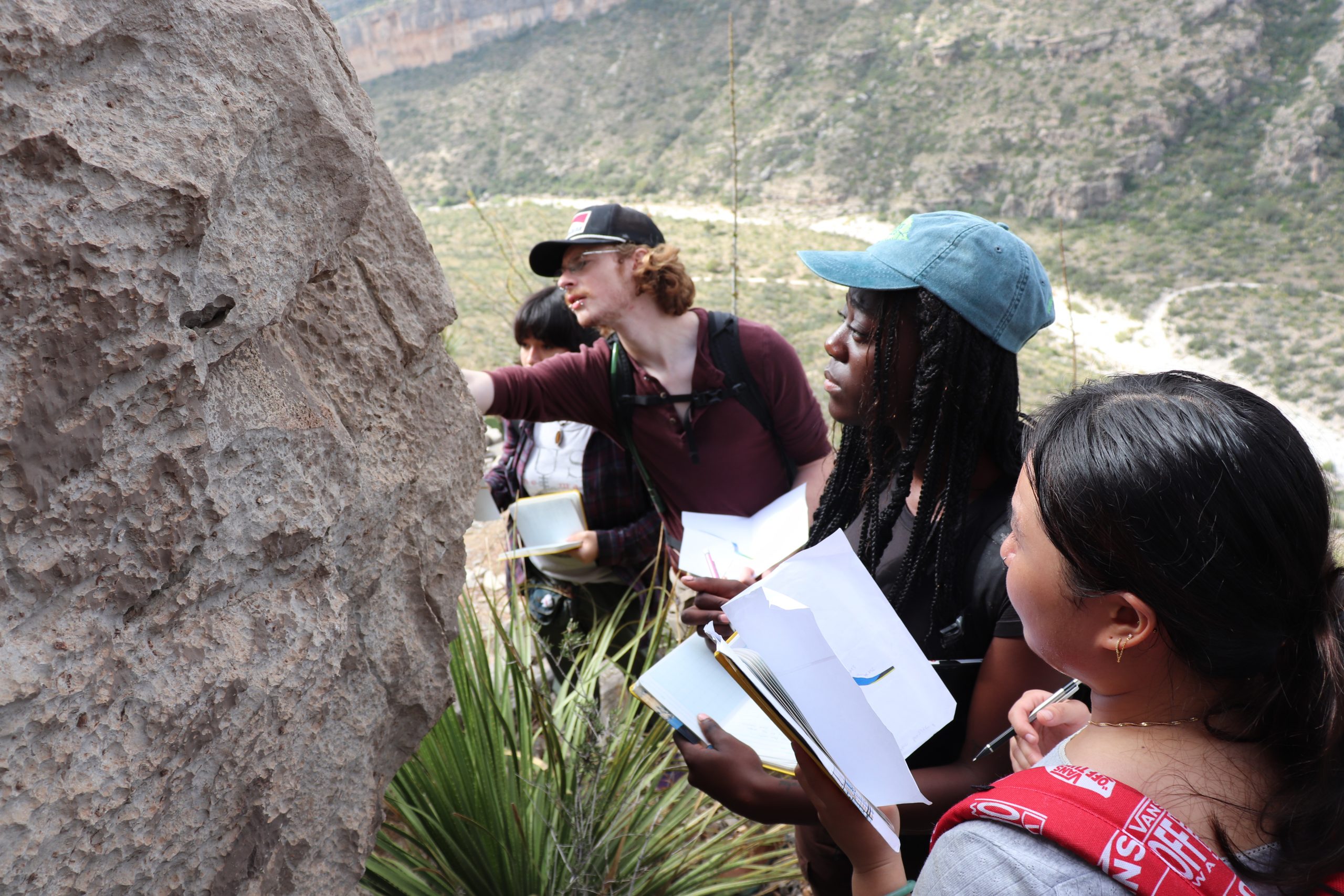
B.S. in General Geology
The General Geology major is for students who want to learn how the Earth works from a quantitative, scientific perspective. They will receive a comprehensive understanding of solid and surface earth processes while having the freedom to dive into concentrations of study they’re most interested in — be it sedimentology, paleontology, energy geoscience, or marine geoscience, to name a few options.
Why geology?
We are living in a critical moment where water resources, the climate, environment, energy landscape, and geological hazards are all forming into a nexus of issues that affect our daily lives. In 100 years, society won’t exist as it does today without a new generation of geoscientists to solve these problems. From the classroom to the lab to the field, geology students will solve real world problems with critical thinking skills and quantitative reasoning.
What do geologists do?
Geologists study the ground beneath our feet, whether on Earth or on distant planets, from the surface down to the inner core. Geologists explore what rocks can tell us about the processes that control our complex planetary system. Through field experiments, computation, and remote sensing, geologists can decipher Earth’s history.

Career and graduate school opportunities
With a geology degree, students are equipped to monitor and understand natural hazards, contribute to the search for energy resources, aid in critical decision-making efforts about our environment, explore the solar system, and conduct research on everything from dinosaurs to the formation of mountain ranges.
Graduate school disciplines students will be ready for
- Geology
- Geoscience
- Planetary science
- Oceanography
- Geobiology
- Geochemistry
Industries hiring geologists
- Energy
- Government labs
- Insurance
- National security
- Public policy
- Geological consulting
- Environmental consulting
- Computing and AI Technology
- Aerospace
Wage data for related jobs with a bachelor’s degree
$99,240
Geoscientists
$101,020
Mining and Geological Engineers
$80,060
Environmemental Scientists
Median annual wage data courtesy of the Bureau of Labor Statistics
Research opportunities
General geology majors have the opportunity to conduct research with top scientists from all three of the Jackson School’s units — the Department of Earth and Planetary Sciences, the Institute for Geophysics, and the Bureau of Economic Geology. For example, students can conduct research in field-based studies from the desert southwest to the Himalayas to Antarctica, or on the geophysical imaging of other planets, or on the dynamics of the earth.
All Jackson School undergraduates have an abundance of research opportunities at their fingertips. Explore more on our Undergraduate Research page.
Degree requirements
Every Jackson School undergraduate is required to take foundational courses that cover the breadth of the geosciences, along with advanced courses specific to their major. Students will explore these fields, advancing their quantitative reasoning skills, developing computational literacy, applying geospatial tools, and learning how to manage, evaluate, and visualize data.
This course list represents requirements from the newest version of the major. Students must work with their academic advising coordinator to confirm which courses are required for their degree and catalog year.
Geoscience courses
These are the courses required of all Jackson School undergraduates. They will typically be completed within the first two years of study.
Learn if geosciences is right for you, and choose any class you like. Take at least three credits (one class).
- GEO 303E: Earth in 2100
- GEO 401: Physical Geology
- GEO 302C: Climate: Past, Present, Future
- GEO 302D: Dinosaurs
- GEO 302E: Earth, Wind, and Fire
- GEO 302G: Earth Science/Sustainability
- GEO 302J: Crisis of Our Planet
- GEO 302M: The Age of Mammals
- GEO 302N: National Parks
- GEO 302Q: Gems & Minerals
- GEO 303: Introduction to Geology
- GEO 303C: Intro Solar System
Hone your skills in observation, data gathering, and interpretation. Take at least six credits (two classes).
- GEO 420K: Introduction to Field and Stratigraphic Methods
- GEO 405: Life Through Time
- GEO 311D: Geodata
- GEO 315L: Earth from Lab to Planet
These courses span all aspects of the geosciences and provide you the foundation for more advanced study in your area of interest. Take 12 credits (all three classes).
- GEO 416W: Climate, Water, and the Environment
- GEO 416E: Solid Earth Processes
- GEO 416S: Integrating Earth & Planetary Processes Through Time
Develop your skills in the quantitative analysis of geosciences data and theories. Take at least six credits (two classes).
- PGE 338: Geostatistics and Data Analysis
- GEO 325G: Computational Applications in the Geosciences
- GEO 352P: Python for Geoscience Research
- GEO 325M: Numerical Modeling in the Geosciences
- GEO 378D: Introduction to Machine Learning and Geosciences
- GEO 366M: Mathematical Methods in Geophysics
- GEO 322E: Scientific Research Design
Geology foundation courses
These are the courses every geology major is required to take.
These upper-division courses prepare students to understand and examine the foundations of geophysical phenomena. Take at least three credits (one class).
- GEO 455S: Introduction to Remote Sensing for Geoscientists
- GEO 327G: Geographic Information System and Global Positioning System Applications in Earth Sciences
These are intensive three-week courses where you will learn by doing. Take six credits (two classes).
- GEO 376L: Field Methods in Groundwater Hydrology
- GEO 660A: Interpretation of Sedimentary and Volcanic Environments in the American West
- GEO 660B: Interpretation of Structures, Basins, and Landforms in the Rocky Mountains
- GEO 348K: Marine Geology and Geophysics Field Course
Disciplinary fundamentals
You will dive deeper into the fundamentals of the topics and sub-disciplines you are most interested in. Take at least 15 credits (five classes) of any geological science courses; nine of those credits (three classes) must be upper-division. You can take these 15 credits however you see fit. Here are some proposed course combinations that are grouped by discipline.
Junior recommendations. Take six credits (two classes).
- GEO 426P: Igneous and Metamorphic Petrology
- GEO 428: Structural Geology
- GEO 354: Physics of Earth
Senior recommendations.
- GEO 326D: Earth in Deep Time
- GEO 376C: Isotope Geology
- GEO 371T: Thermodynamics in Earth and Planetary Sciences
- GEO 376T: High-Temperature Geochemistry
- GEO 358K Volcanology
- GEO 341F: Microstructures and Rock Rheology
- GEO 356S: The Ins and Outs of Subduction Zones
- GEO 338T/339T: Marine &Continental Tectonics
- GEO 350L: Tectonic Geodynamics
- GEO 325M: Numerical Modeling in the Geosciences
- GEO 465K: Seismic Exploration
Junior recommendations. Take six credits (two classes).
- Introduction to Ocean Sciences
Senior recommendations. Take nine credits (three classes).
- GEO 385Q: Geomorphology Process and Form
- GEO 338J: Marine Geology
- Understanding Sea Level
- GEO 364P: Physical Oceanography
- GEO 376C: Isotope Geology
- GEO 371C Topic: Glaciology
Junior recommendations. Take six credits (two classes).
- Introduction to Ocean Sciences
- GEO 354: Physics of Earth
Senior recommendations. Take nine credits (three classes).
- GEO 326D: Earth in Deep Time
- GEO 338J: Marine Geology
- Mass Extinctions
- Human Evolution/Biodiversity
Junior recommendations. Take six credits (two classes).
- GEO 354: Physics of Earth
- GEO 385Q: Geomorphology Process and Form
- GEO 426P: Igneous and Metamorphic Petrology
Senior recommendations. Take nine credits (three classes).
- GEO 366P: Planetary Geology & Geophysics
Take six credits (two classes) from two different groups below
Geochemistry & petrology
- GEO 376C: Isotope Geology
- GEO 376T: High-Temperature Geochemistry
- GEO 371T: Thermodynamics in Earth and Planetary Sciences
Geophysics and tectonics
- GEO 350L: Tectonic Geodynamics
- GEO 325M: Numerical Modeling in the Geosciences
- GEO 365P: Potential Field Applications in Geophysics
- GEO 465K: Seismic Exploration
- GEO 428: Structural Geology
Earth History & Life
- GEO 326D: Earth in Deep Time
- GEO 322J: Transitions in History of Life
Climate
- GEO 371C Topic: Glaciology
- GEO 320S: Introduction to Atmospheric Science
Junior recommendations. Take six credits (two classes).
- GEO 426P: Igneous and Metamorphic Petrology
- GEO 428: Structural Geology
- GEO 354: Physics of the Earth
Senior recommendations. Take nine credits (three classes).
- GEO 338T/339T: Marine &Continental Tectonics
- GEO 465K: Seismic Exploration
- GEO 371T: Basin Geomechanics
- GEO 390M: Thermodynamics of Geological Processes
Building block requirements
These courses take place outside of the Jackson School and are required of all geology majors. This major requires a robust understanding of mathematics, physics, and chemistry to prepare students for advanced classes specific to the degree.
Take each of the classes listed for either Option 1 or Option 2.
Option 1:
- M 408C: Differential and Integral Calculus
- M 408D: Sequences, Series, and Multivariable Calculus
Option 2:
- M 408K: Differential Calculus
- M 408L: Integral Calculus
- M 408M: Multivariable Calculus
Take each of the classes listed for either Option 1 or Option 2.
Option 1:
- PHY 301: Mechanics
- PHY 101L: Laboratory for Physics 301
- PHY 316: Electricity and Magnetism
- PHY 116L: Laboratory for Physics 316
Option 2:
- PHY 303K: Engineering Physics I
- PHY 105M: Laboratory for Physics 303K
- PHY 303L: Engineering Physics II
- PHY 105N: Laboratory for Physics 303L
Take at least six credits (these two classes; labs are not required).
- CH 301: Principles of Chemistry I
- CH 302: Principles of Chemistry II
Read more about these courses in the University of Texas course catalog.
The 2024-2026 general geology degree plan is available on the University Catalogs website.
Past degree plans: 2022-2024 | 2020-2022 | 2018-2020 | 2016-2018 | 2014-2016
Complementary minors
General geology majors can select any minor available to University of Texas undergraduate students. Here are a few that we recommend pairing with a geology degree in order to further your expertise in related subjects such as energy, sustainability, and policy.
- Leadership in Global Sustainability
- Public Policy
- Energy Management
- Sustainable Energy
- Energy Management
- Environment and Sustainability
- Business and Public Policy
- Risk Management
Next steps: Applying and transferring
Ready to start changing the world? If you’re a high school student interested in applying to the Jackson School to be a geology major, please select Geological Sciences during the process of your undergraduate application to The University of Texas at Austin. Additional application information can be found on the UT Office of Admissions website and the Jackson School’s Admissions page.
Thinking of transferring to the Jackson School to be a geology major? If you’re an undergraduate student already enrolled at The University of Texas at Austin, you may enter the Jackson School through an internal transfer process which occurs twice a year. Please visit the Jackson School’s Internal Transfers webpage for details about the internal transfer process, deadlines, and upcoming information session dates to learn more about our school and programs. We also encourage you to contact academic advising before you start this process.